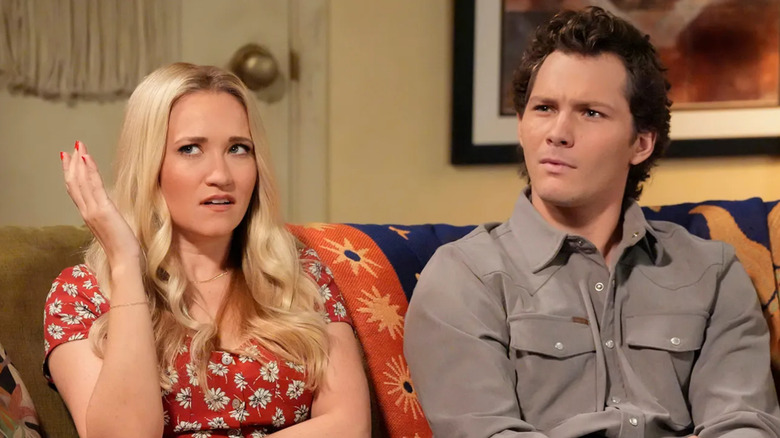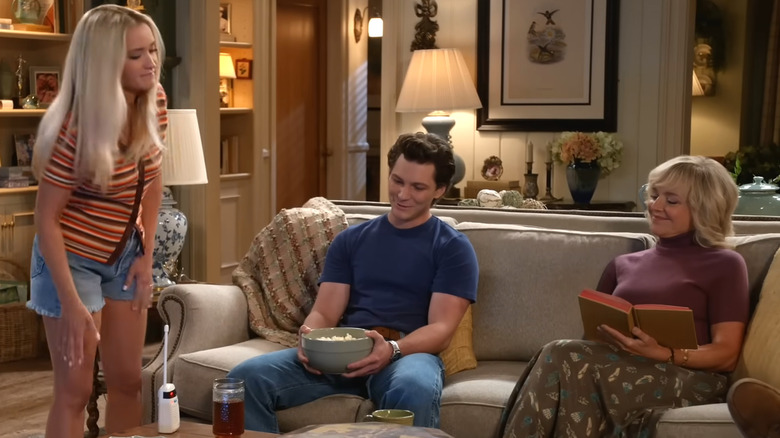Georgie And Mandy's First Marriage Episode 1 Explains One Young Sheldon Change
When "Young Sheldon" first aired, the most jarring aspect was the lack of a laugh track. Its parent show, "The Big Bang Theory," was a standard multi-camera sitcom with a laugh track that was arguably a little too loud, at least according to the haters. The fact that "Young Sheldon" chose the single-camera no-laughter route — much like "Malcolm in the Middle" or "Scrubs" — was a surprise choice with a lot of meta implications. Why does old Sheldon get a laugh track but young Sheldon doesn't?
Of course, fans quickly got used to the lack of laughter on "Young Sheldon" (which made it a better show), especially as the show grew darker as the characters matured. We've grown so accustomed to watching the Cooper family in this new realistic format that its spinoff show, "George & Mandy's First Marriage," now has the opposite problem: the show has a laugh track even though its parent show had none.
Although the show offers no explicit explanation for the change, the pilot does at least address the issue. It features a scene where Georgie (Montana Jordan) is watching a sitcom on TV and remarks, "I love laughing shows." He soon elaborates, "Some shows you can hear people laughing, and some you can't." Georgie brings up "The Wonder Years," an '80s sitcom that was one of the first to ever embrace the single-camera format. Georgie remarks, "No one's laughing. Is it funny? We'll never know!"
It's a fun meta moment, one that at least helps to let the viewers understand that the show knows this is an awkward transition. Granted, it's not really an explanation, so much as an example of the show making fun of itself before the viewer has the chance to.
The showrunners understand that you might not love the change
In a recent interview with TVLine, showrunner Steve Holland explained the reason they included that opening joke about the laugh track:
"As we were talking about the show and the switch to multi-cam — which, you know, I'm not sure that there has ever been a show that went from single- to multi-cam — we knew that it was going to be a thing that people were going to have a reaction to, and it was going to be a thing that people talk about, and we just thought, 'Why don't we get in front of it? Let's own it and not try to pretend like we don't know that there's a difference here.'"
Holland didn't explain why they chose the laugh track in the first place, but other members of the cast and crew have talked about preferring the change. "I've paid my dues with multi-cam, and it's so fun," said Emily Osment, who started off on laugh-track-heavy shows like "Hannah Montana." She continued, "It's just a completely different experience... My favorite part of that is the live audience, and feeling like you're doing a new play every week. I really enjoy that process."
On a meta-level, the clearest reason for the shift seems to be that "George & Mandy's First Marriage" is not trying to be as serious as "Young Sheldon" was. That prequel spinoff series featured some surprisingly intense sequences like the Cooper family having to survive multiple tornados, not to mention George Sr.'s multiple heart attacks. "Young Sheldon" was interested in exploring the characters on a slightly deeper level than "The Big Bang Theory" ever did, making for a TV series that felt surprisingly raw and grounded.
"George & Mandy's First Marriage," meanwhile, seems to be going for slightly comfier, easier entertainment. That's reflected in how the show's structure — focusing on the adults raising a family as opposed to the kids dealing with puberty — is much closer to a traditional sitcom's dynamic. It's not for everyone of course, but it does have its charms. At the very least, we'll always know when we're supposed to laugh.

